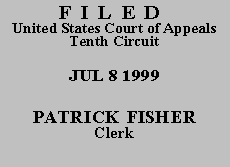

| HASSAN ABD'AL LATIF
v.
MICHAEL WILLIAMS, Warden;
ATTORNEY GENERAL OF THE
STATE OF |
|
This appeal is from orders of the district court dismissing petitioner's application for a writ of habeas corpus brought pursuant to 28 U.S.C. § 2254 and denying his request for a certificate of appealability. Petitioner now seeks a certificate of appealability in this court, alleging that the district court erred in holding that his state procedural default barred federal habeas review of his claims. We decline to grant a certificate of appealability.
On September 18, 1990, petitioner pled guilty to two counts of aggravated robbery in the District Court, City and County of Denver, State of Colorado. On January 6, 1995, Mr. Latif sought post-conviction relief in the state courts by filing a pro se Motion to Withdraw Plea pursuant to Colorado Rule of Criminal Procedure 35. In his motion, petitioner argued that his guilty plea was involuntary and that there was an insufficient factual basis for his guilty plea.(1) The state courts denied petitioner's motion as untimely. On October 30, 1998, petitioner filed an application for a writ of habeas corpus in the United States District Court for the District of Colorado. The habeas petition raises the same claims presented to the state courts in Mr. Latif's plea withdrawal motion. The district court dismissed Mr. Latif's habeas petition due his procedural default in state court. On appeal, petitioner argues that the district court erred in finding that he failed to show cause and prejudice justifying his state procedural default.
We review de novo the legal basis for the district court's dismissal of Mr. Latif's § 2254 petition. See Jackson v. Shanks, 143 F.3d 1313, 1317 (10th Cir.), cert. denied, __ U.S. __, 119 S. Ct. 378 (1998). Under 28 U.S.C. § 2254(b)(1), we may not grant a writ of habeas corpus unless it appears that the applicant has either exhausted his state remedies or that there exists no adequate state remedies to protect the applicant's rights. Thus, where, as here, state remedies are no longer available because of state procedural default, a dismissal for failure to exhaust is not appropriate. See Castille v. Peoples, 489 U.S. 346, 350-51 (1989). Nonetheless, federal habeas review of claims defaulted in state court pursuant to an independent and adequate state procedural rule is barred unless petitioner can "demonstrate cause for the default and actual prejudice as a result of the alleged violation of federal law, or demonstrate that failure to consider the claims will result in a fundamental miscarriage of justice." Coleman v. Thompson, 501 U.S. 722, 750 (1991).
We agree with the district court that petitioner has failed to demonstrate cause for his procedural default in state court. The district court did a thorough job of analyzing the issue of whether petitioner has shown cause for the procedural default and we decline to duplicate its analysis. Because petitioner has failed to show cause, we need not consider whether he can demonstrate actual prejudice. We also agree with the district court that petitioner has not shown that a failure to consider his claims will result in a fundamental miscarriage of justice. Consequently, we hold that as a result of petitioner's procedural default in state court, he is not entitled to habeas review of his claims. We therefore DENY Mr. Latif's request for a certificate of appealability. The appeal is DISMISSED.
ENTERED FOR THE COURT,
Deanell Reece Tacha
Circuit Judge
*.This order and judgment is not binding precedent, except under the doctrines of law of the case, res judicata, and collateral estoppel. This court generally disfavors the citation of orders and judgments; nevertheless, an order and judgment may be cited under the terms and conditions of 10th Cir. R. 36.3.
1. We construe petitioner's filings below and those in this court liberally because petitioner represents himself. See Haines v. Kerner, 404 U.S. 519, 520-21 (1972).